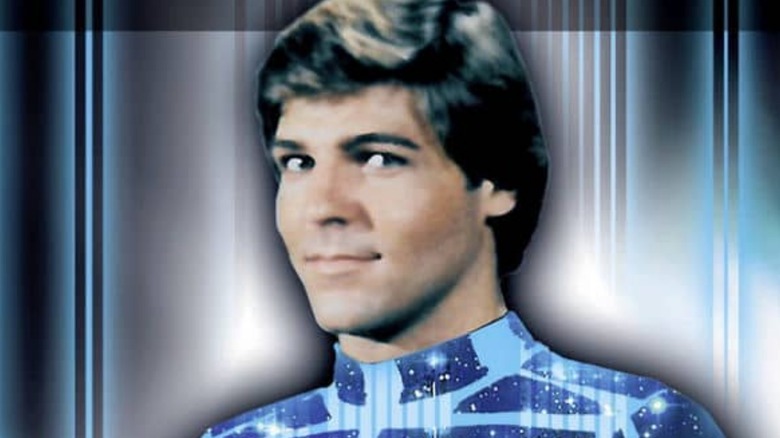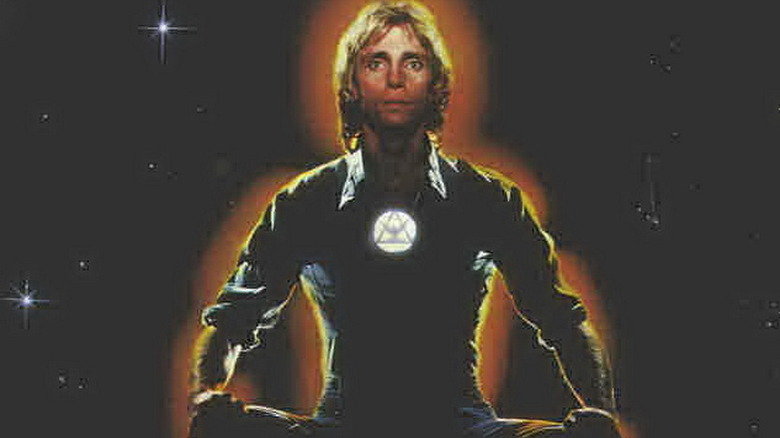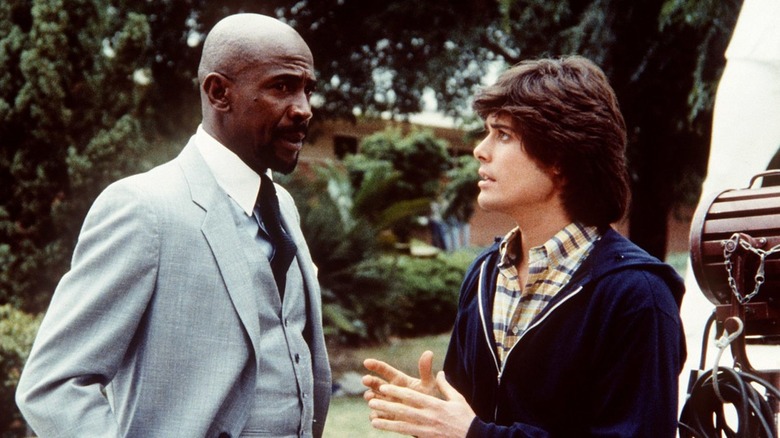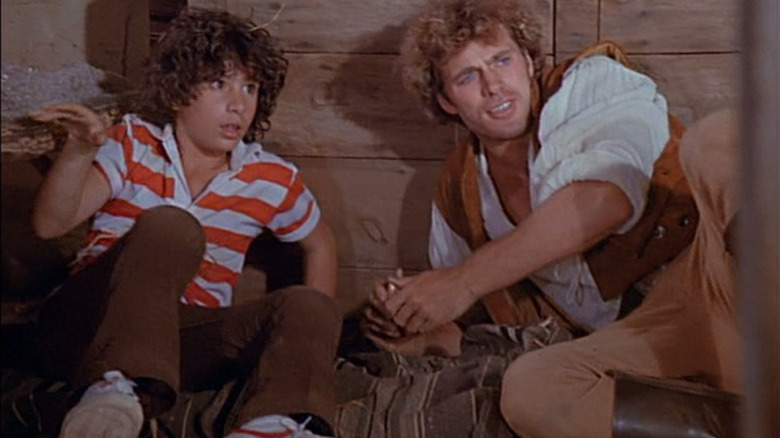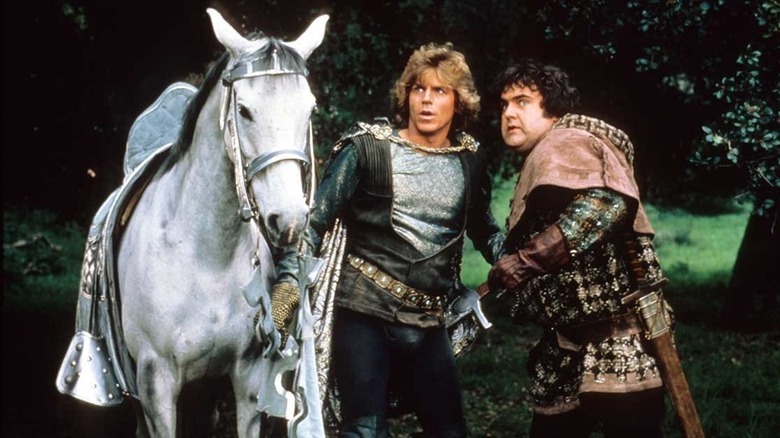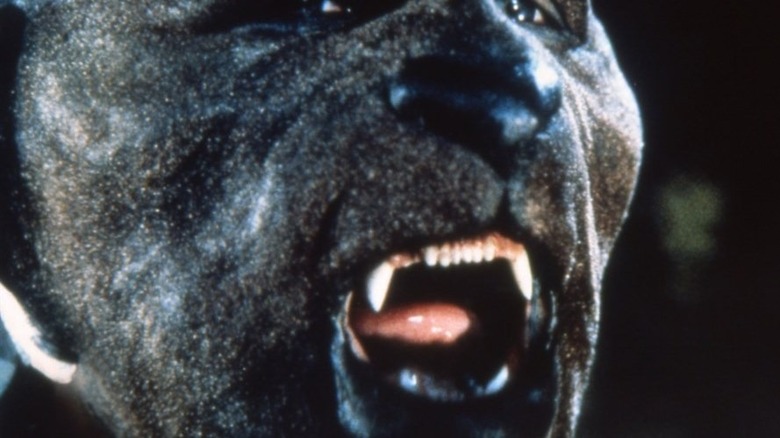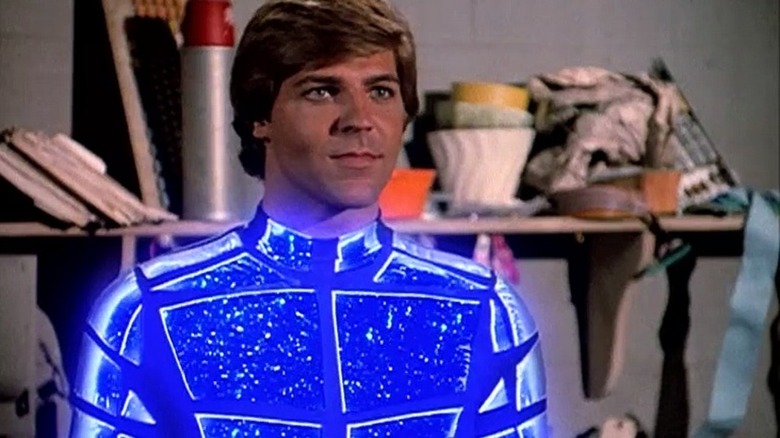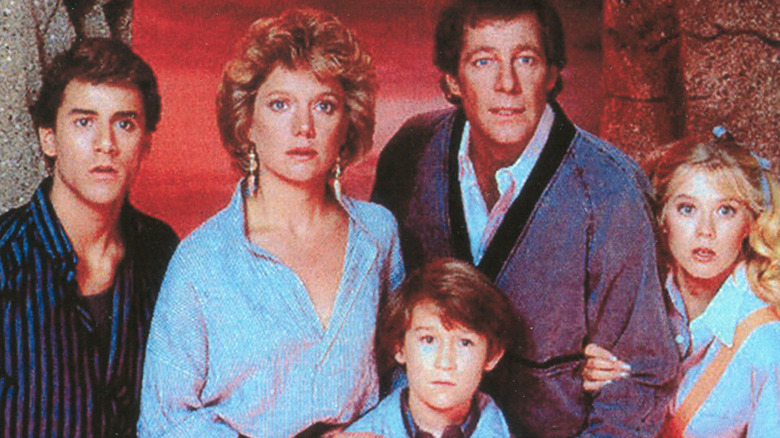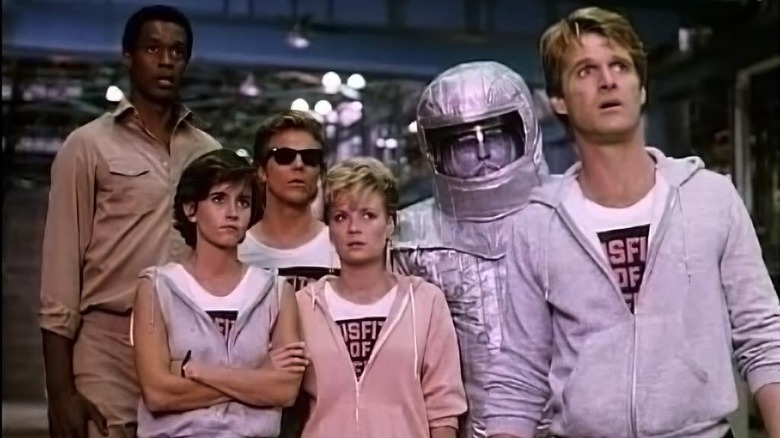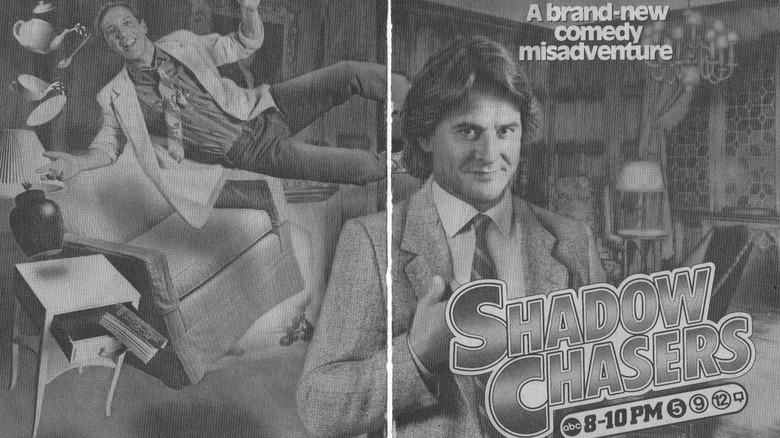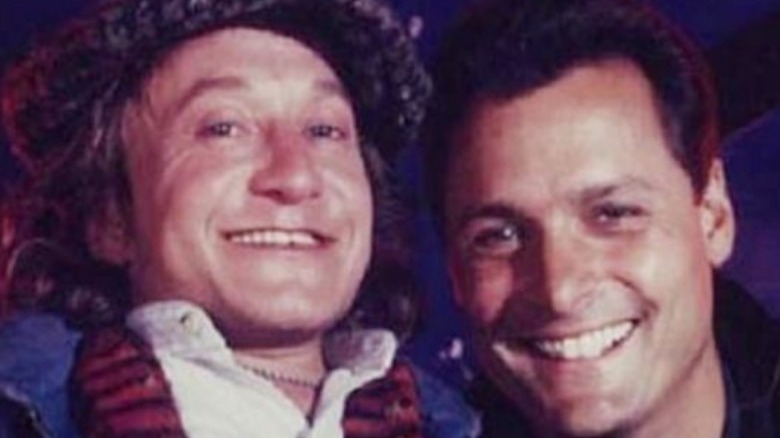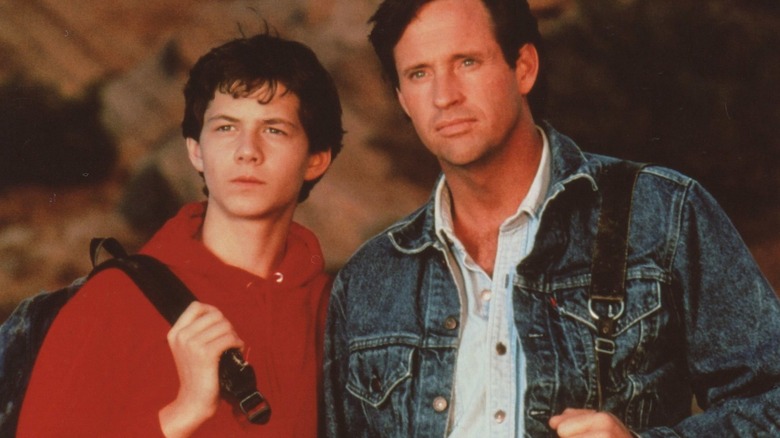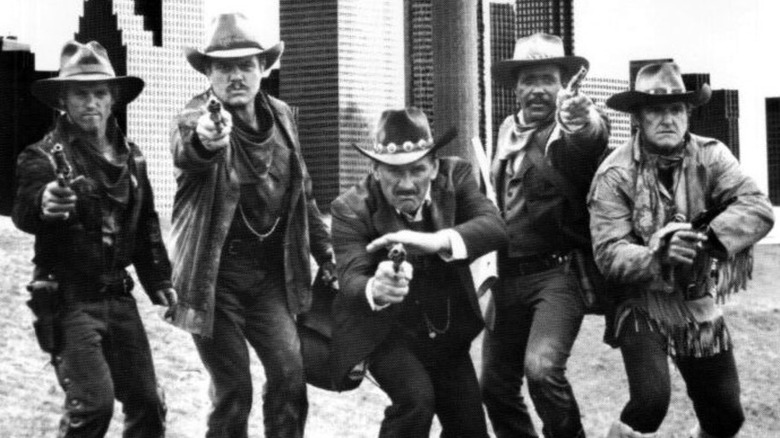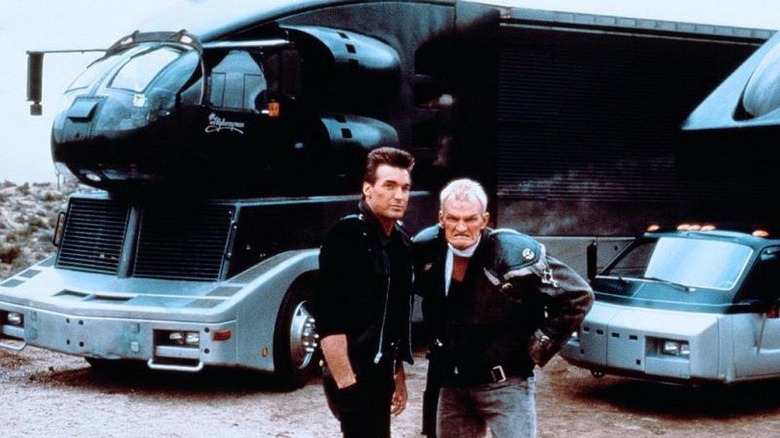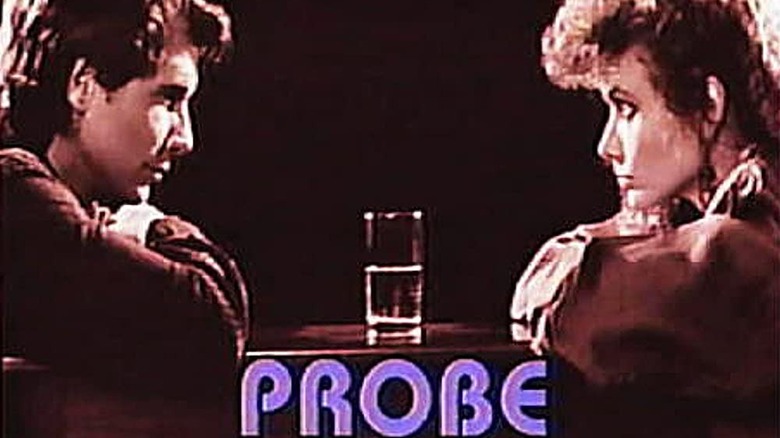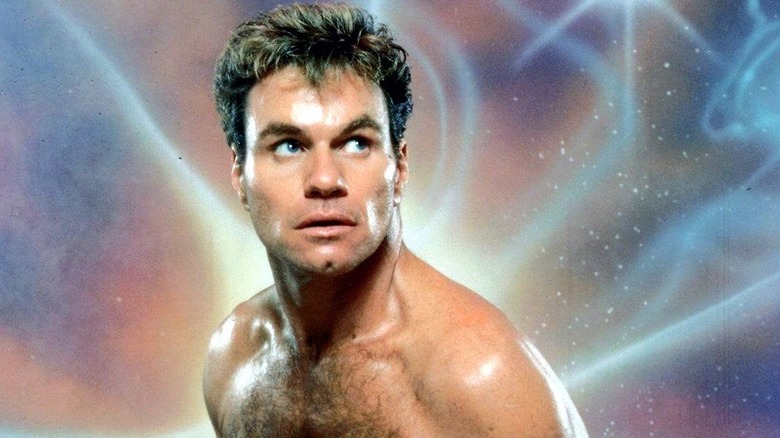Single-Season '80s Sci-Fi And Fantasy Shows That Deserve A Second Shot
The '80s were the decade when KITT prowled the streets and Airwolf patrolled the skies, when a school teacher stepped up to serve as the greatest American hero, and when a government scientist took his first quantum leap back in time to put right what once went wrong.
But '80s television also boasted legions of less-watched stealth superheroes: phoenixes and probing prodigies and extraterrestrial ex-cons, wizards and warriors, manimals and automen, and voyagers to other worlds. Maybe their shows were stuck in no-win timeslots. Maybe the writing didn't live up to their series' promising concepts. Maybe TV audiences four decades ago simply weren't ready for them yet.
Whatever the reason, these 15 sci-fi and fantasy shows from the '80s deserved more than a single season, and are just waiting to be renovated and relaunched for modern audiences. Here's what they're about, why they failed, and — most importantly — how they could be given a second chance.
The Phoenix
What was it about? The alien Bennu of the Golden Light (Judson Scott) was left on Earth to find Mira (Sheila Frazier), another being from his home world, who was placed on Earth as his companion thousands of years before to inform him of his ultimate mission. Bennu boasted an array of paranormal powers, enhanced by his Phoenix amulet, which drew strength from the Sun. While he was doggedly pursued by government agent Justin Preminger (Richard Lynch), Bennu's greater foe was Yago, an evil being from his home world who was connected to the Moon in the same way that Bennu was to the Sun.
Why didn't it work? Poor ratings, thanks to airing in the "Friday night death slot."
How could it be made to work? Reboot. Tales of ancient aliens visiting Egyptians and Mesoamericans can be fun, but not if they fail to respect the cultures they're portraying. Cast Egyptian-American actor Rami Malek as Bennu (the Egyptian word for Phoenix), and have his quest for Mira double as an Indiana Jones-style hopscotch around ancient archaeological sites, highlighting the actual histories and heritage of those cultures along the way.
The Powers of Matthew Star
What was it about? High school student Matthew Star (Peter Barton) posed as a "typical American teenager," fooling even his girlfriend, Pam Elliot (Amy Steel), but was secretly the exiled crown prince of an alien planet, forced into hiding on Earth after an intergalactic armada conquered his home world. Matthew struggled to balance schoolwork and dating with dodging alien assassins, but was aided by an ally of the royal family, Walt Shepherd (Louis Gossett Jr.), who worked as a science teacher at his school.
Why didn't it work? Poor ratings, radical midseason retooling, and harsh reviews from critics. Matthew and Walt went from occasionally aiding the military's extraterrestrial investigations to serving as full-time government agents, but TV Guide still ranked it 22 on the "50 Worst TV Shows of All Time" in 2002.
How could it be made to work? Reboot. Imagine "Smallville" if Clark Kent arrived on Earth as an adolescent rather than as an infant. As an immigrant, how much of your new home's culture do you choose to adopt, and how much of your heritage do you hold onto?
Voyagers!
What was it about? Orphaned history buff Jeffrey Jones (Meeno Peluce) was accidentally swept up into the time-traveling adventures of Phineas Bogg (Jon-Erik Hexum), a member of a society of "Voyagers" sworn to ensure the events of history unfold properly. Because the handsome Bogg had more of an eye for the ladies than he did a head for history, Jeffrey drew from the lessons of his departed father, a history professor, to help guide them in setting events right.
Why didn't it work? Not poor ratings, for once. "Voyagers!" averaged a 17 share opposite the top-rated "60 Minutes" and seemed set for a second season, until executives believed they could beat "60 Minutes" with a competing news program, and canceled "Voyagers!" (for the record, NBC's execs were wrong).
How could it be made to work? Reboot. It already worked. Boy genius Jeffrey is the brains of the outfit, while Bogg provides the muscle and the ability to charm historic heroines such as Cleopatra. As Tom Shales said in The Washington Post, "Voyagers!" was "a joy ride from start to finish."
Wizards and Warriors
What was it about? From neighboring kingdoms, the good prince Erik Greystone (Jeff Conaway) and his husky loyal sidekick Marko (Walter Olkewicz) constantly came to blows with the evil Prince Dirk Blackpool (Duncan Regehr), often over the spoiled Princess Ariel (Julia Duffy), while the evil wizard Vector (Clive Revill) hatched his own schemes.
Why didn't it work? Poor ratings, in spite of some notably positive reviews and expensive special effects.
How could it be made to work? Reboot. Moviegoing audiences in 1984 weren't ready for the sci-fi satire of "The Ice Pirates," but by 2014, they were ready for "Guardians of the Galaxy." Similarly, "Wizards and Warriors" was praised by the Dallas Morning News as a "vastly underappreciated satire," and after "The Princess Bride" in 1987 and "Galavant," which aired from 2015 to 2016, the swords-and-sorcery subgenre is arguably ripe for self-aware comedic commentary.
Conclude the reboot's pilot episode by revealing that Erik and Marko are tabletop role-players from modern-day Earth — show them sharing a "Wizards & Warriors Player's Handbook" — who inexplicably find themselves inhabiting the reality of their game, à la "Jumanji," and are on a quest to solve this mystery.
Manimal
What was it about? Wealthy, well-traveled professor of criminology Dr. Jonathan Chase (Simon MacCorkindale) inherited the quasi-mystical ability to shapeshift into a veritable menagerie of animals, which he used to secretly assist the police, for whom he already served as an official consultant.
Why didn't it work? Poor ratings (the Friday night death slot strikes again), expensive special effects, and harsh reviews from critics, including fellow NBC show "Late Night with David Letterman."
How could it be made to work? Reboot. William Conrad's opening narration mentioned that Chase traveled to Africa and Tibet, but most episodes rarely strayed from the territory of generic cop show plots. Take the series out of the big city by recasting Chase as a professor of cryptozoology. Send Chase around the world to investigate reports of cryptids in other lands (and seas), in hopes of learning more about his own origins, and generate dramatic tension by revealing that he not only identifies with mythical creatures, but also struggles to control his more feral animal nature. Also, take advantage of the advances in affordable special effects since 1983 by not repeatedly reusing the same transformation footage.
Automan
What was it about? Police officer and computer programmer Walter Nebicher (Desi Arnaz Jr.) created an artificially intelligent crime-fighting program that became an "Automatic Man" (Chuck Wagner), or "Automan" for short. Automan generated hard-light holograms through his floating polyhedron sidekick Cursor, usually of various "Tron"-influenced vehicles, and posed as government agent "Otto J. Mann" so that he and Walter could work on police cases together.
Why didn't it work? Poor ratings and expensive special effects.
How could it be made to work? Parody remake. In 2017, Red Giant Software teamed up with "Stargate" actor David Hewlett to produce the comic short film "Hewlogram." Wagner appeared in an after-credits cameo, which affectionately poked fun at how no part of computer technology has ever worked the way it did in "Automan."
With three DVD releases collecting the complete "Automan" series released between 2012 and 2015, it's clear that there's an abiding affinity for this otherwise overlooked, admittedly silly show. Deliver some dazzling visuals with a "Tron"-inspired sheen, cast a pair of co-leads with authentically chummy chemistry, and encourage the audience to laugh along with the outlandishly scientifically inaccurate hijinks, rather than at them.
Otherworld
What was it about? The vacationing Sterling family toured inside the Great Pyramid of Giza during a 10,000-year conjunction of the planets, which transported them to another world in what was apparently an alternate universe. This "otherworld" of Thel was divided into 77 "zones," each containing an entirely different society, with travel tightly regulated by "Zone Troopers." The Sterlings ran afoul of Kommander Nuveen Kroll (Jonathan Banks), the Zone Trooper who pursued them for the rest of the series, as they searched for the capital province of Imar, which legends implied might offer them a way back to Earth.
Why didn't it work? Poor ratings, as Saturdays went from must-watch TV nights to shedding viewers, and mixed reviews from critics.
How could it be made to work? Sequel. You don't pass up casting Jonathan Banks — Mike Ehrmantraut from "Breaking Bad" and "Better Call Saul" — as your recurring villain. Another American family visits Egypt, gets transported to Thel, and is pursued by Kroll, who cryptically alludes to the Sterlings' quest to return home as we're treated to the fantastically diverse societies (and pointed social commentaries) of each zone.
Misfits of Science
What was it about? Renegade research scientist Dr. Billy Hayes (Dean Paul Martin) and his colleague and best friend, the size-changing Dr. Elvin "El" Lincoln (Kevin Peter Hall) studied "human anomalies" at the Humanidyne Institute. In the process, they recruited electrically powered rock-and-roll musician Johnny "Johnny B" Bukowski (Mark Thomas Miller) and telekinetic teenager Gloria "Glo" Dinallo (Courteney Cox) as their fellow "Misfits of Science."
Why didn't it work? Poor ratings and expensive special effects.
How could it be made to work? Sequel. One name among that cast stands apart from the rest.
Martin and Hall both passed away, and Miller mostly stopped acting after 1991, but Courteney Cox, once the team's ingénue, is now overqualified to play Dr. Gloria Dinallo, senior research scientist at Humanidyne, as she recruits the next generation of "Misfits" to save the world from science gone weird. It's Marvel's X-Men with the serial numbers scrubbed, and without being beholden to "mutant genes" as the singular, boring origin for all the characters' superpowers. It's about benevolently mad scientists furnishing a laboratory home for all of us freaks of nature.
Shadow Chasers
What was it about? Genteel British anthropologist Dr. Jonathan MacKensie (Trevor Eve) worked for Dr. Julianna Moorhouse (Nina Foch), his department head at the fictional Georgetown Institute Paranormal Research Unit, and struck up a partnership of mutual convenience with garish tabloid reporter Edgar "Benny" Benedek (Dennis Dugan), after being forced to investigate an alleged haunting. The odd couple grudgingly agreed they worked well together and teamed up regularly.
Why didn't it work? Not just poor ratings, but the worst ratings of all 106 shows in the 1985-1986 TV season, thanks to its Bataan Death March of a timeslot — it aired opposite NBC's "The Cosby Show" and "Family Ties" on Thursdays from 8-9 p.m. — in spite of celebrities such as Ricardo Montalbán and Ron Howard promoting the show in amusing commercials.
How could it be made to work? Reboot. This was 100% intended to be TV's "Ghostbusters" with two fewer team members (both Filmation's "Ghostbusters" and "The Real Ghostbusters" animated series premiered in 1986), but it could be "The X-Files," minus the "mytharc" that came to dominate every episode. Imagine "Jose Chung's From Outer Space," each week.
The Wizard
What was it about? Simon McKay (David Rappaport), an inventor with dwarfism, devoted himself to toymaking and philanthropy, but in spite of his pacifism and altruism wielded enough genius that government agent Alex Jagger (Douglas Barr) was assigned to protect him from those who would exploit his creativity for more destructive purposes. Those foes included Simon's mad-scientist archenemy Troyan (Roy Dotrice), a fellow former employee of the Pentagon.
Why didn't it work? Poor ratings, rescheduling to the Thursday night death slot, and expensive special effects.
How could it be made to work? Reboot. Online fans of the original series are still calling for a DVD release, but Rappaport passed away in 1990, so a sequel wouldn't be possible. Simon McKay's character arc remains resonant nonetheless. He turned his efforts toward world peace after suffering a bad brush with weaponry he helped design for the U.S. military. Sound familiar? Everyone loved Peter Dinklage as Tyrion Lannister in "Game of Thrones," so this is TV's chance to cast him as Tony Stark, exploring the cutting-edge technology and the applications of the toys and video games of today (and tomorrow).
Starman
What was it about? A sequel to John Carpenter's 1984 film "Starman," this TV adaptation revised the timeline by setting the film 15 years prior to 1986, even though that predated the 1977 launch of the Voyager 2 space probe, to which the "Starman" originally responded.
In the show, the Starman returned to Earth, cloned another human body (Robert Hays), and connected with his teenage son, Scott Hayden Jr. (Christopher Daniel Barnes) as they evaded government agents and searched for Scott's mother, Jenny Hayden (recast as Erin Gray for TV).
Why didn't it work? Poor ratings (Friday and Saturday night death slots) and mixed reviews from critics.
How could it be made to work? Direct sequel to the film, replacing the previous show. Bring back Jeff Bridges as "Scott Hayden" — without the uncanny valley-triggering digital de-aging used in "Tron: Legacy" — and Karen Allen as Jenny Hayden, if at all possible. Given the similarity in looks between Bridges and Kurt Russell, cast Wyatt Russell as Scott Jr. No need to fudge the timeline anymore. Generationally, Scott Jr. is a Millennial, so meeting his long-absent alien father merely compounds his preexisting existential angst.
Outlaws
What was it about? In Texas in 1899, Sheriff Jonathan Grail (Rod Taylor) was squaring off for a final showdown against his former allies in the criminal Pike Gang when a lightning bolt struck all five men, transporting them forward in time to 1986.
With no way back to the past, Grail and the gang declared a truce and started the Double Eagle Ranch Detective Agency so they could afford to live in the present day. Grail also struck up a romance with Deputy Maggie Randall (Christina Belford), a Houston detective who assisted the gang on several cases.
Why didn't it work? Poor ratings, in spite of its pilot episode being one of the most-watched shows that week.
How could it be made to work? Reboot. In addition to the "fish out of water" comedy that flows naturally from nudging a posse of Old West outlaws more than a century outside of their comfort zone, there's an opportunity here to comment on the growing cultural divide between rural and urban America under the guise of an action-oriented sci-fi allegory.
The Highwayman
What was it about? In "the near future" (ultimately revealed as 1992), an unnamed law enforcement agency, whose own legal status remained nebulous throughout the show, dispatched its "Highwaymen," each of whom drove a technologically advanced truck that served as a crime lab and weapons arsenal and concealed a helicopter inside, to deal with "the fringes of society's frontiers."
Why didn't it work? Poor ratings, radical midseason retooling, and expensive special effects. The vehicles and high-tech toys were fun, as one expects from "Knight Rider" creator Glen A. Larson, but the series did a sloppy job of defining the parameters of its reality. The titular Highwayman (Sam J. Jones) never revealed his name, as close friends and even fellow Highwaymen called him "Highway" (you're not the Mandalorian, Flash Gordon).
How could it be made to work? Reboot. George Miller's "Mad Max" films work because there's a fully developed mythos behind the vehicles-go-vroom stuff we see onscreen. Maybe, in "the near future," Highwaymen are needed to keep peace in what remains of the United States, which splintered into Balkanized factions without a civil war even being declared.
Probe
What was it about? Asocial prodigy Austin James (Parker Stevenson) founded the think tank Serendip but was uninterested in running it, so Serendip sent secretary Michelle "Mickey" Castle (Ashley Crow) to pester him over paperwork. Mickey was no scientist, but her instinctive insights made her a natural match for Austin, as he consulted for the police and investigated strange scientific mysteries, occasionally stemming from the creations and discoveries of Serendip. Isaac Asimov and "Columbo" co-creator William Link co-created "Probe," so it was well-written.
Why didn't it work? The 1988 Writers Guild of America strike kicked off March 7, the same day this midseason replacement series premiered.
How could it be made to work? Sequel. Austin and Mickey were Mulder and Scully five years early, with the twist that Austin tended to debunk supposedly supernatural occurrences. Stevenson and Crow also possessed an effortlessly endearing "ship-tease" chemistry, on a par with Bruce Willis and Cybill Shepherd in "Moonlighting." Stevenson has told interviewers that "Probe" remains his "favorite" show he's worked on, and if it were resurrected, "I would beg to be part of it."
Hard Time on Planet Earth
What was it about? An alien soldier (Martin Kove) who served in an interplanetary war was subsequently prosecuted for a rebellion against his own planet's rulers. Although found guilty, he was granted an opportunity to reform, in recognition of his wartime service, by being sentenced to live for an indefinite period on planet Earth in a human body, with a floating "Control" robot (voiced by Danny Mann) as his probation officer. Control kept the soldier's violent tendencies in check, and assigned him to help humans he encountered to demonstrate his reformation, reduce the length of his sentence, and eventually end his exile.
Why didn't it work? Poor ratings and harsh reviews from critics. Its premiere ranked 65th out of 81 shows.
How could it be made to work? Reboot, but like the American "Broadchurch" remake with David Tennant, cast Martin Kove (fresh off "Cobra Kai") in the same role he played before. Focus less on the fish out of water antics than on Kove's weathered, weary veteran learning to value the lives of others, while gradually revealing that his rebellion against his rulers was actually justified.
